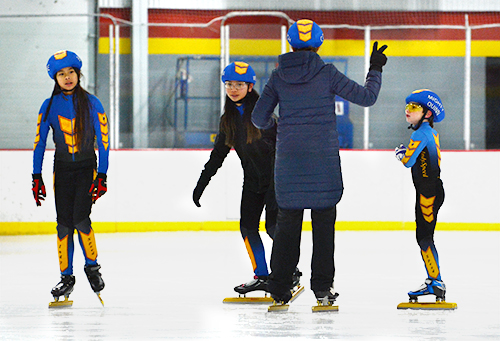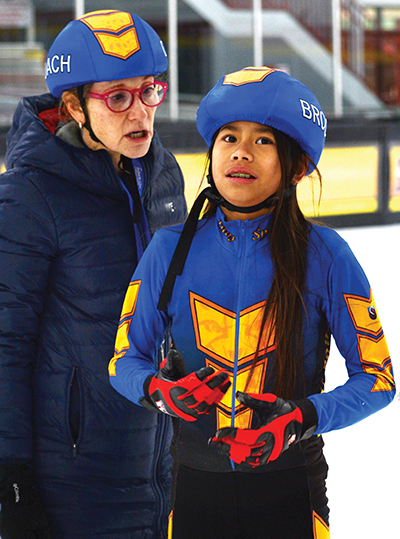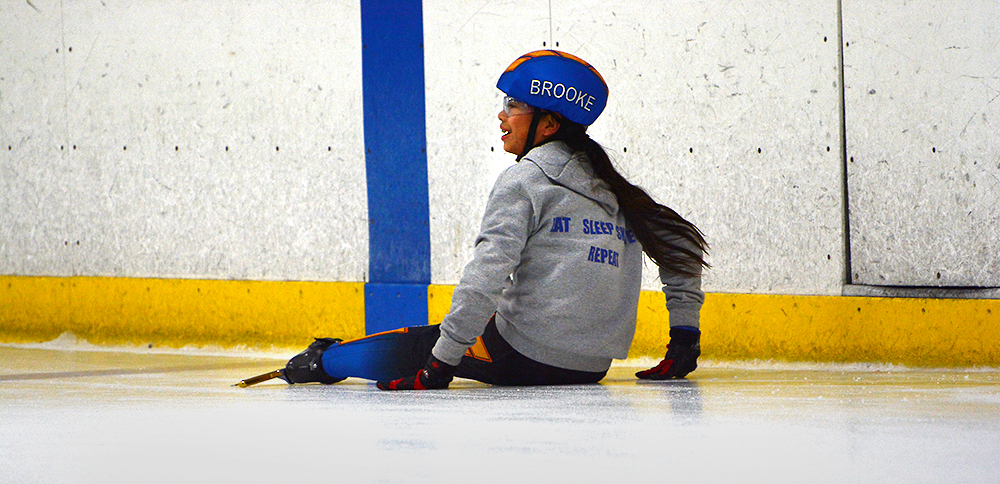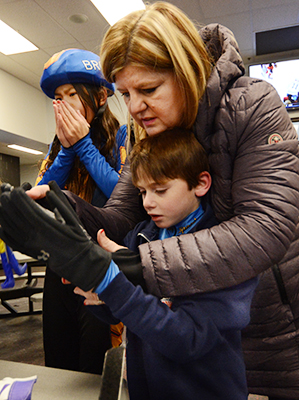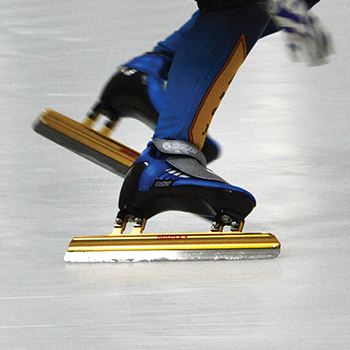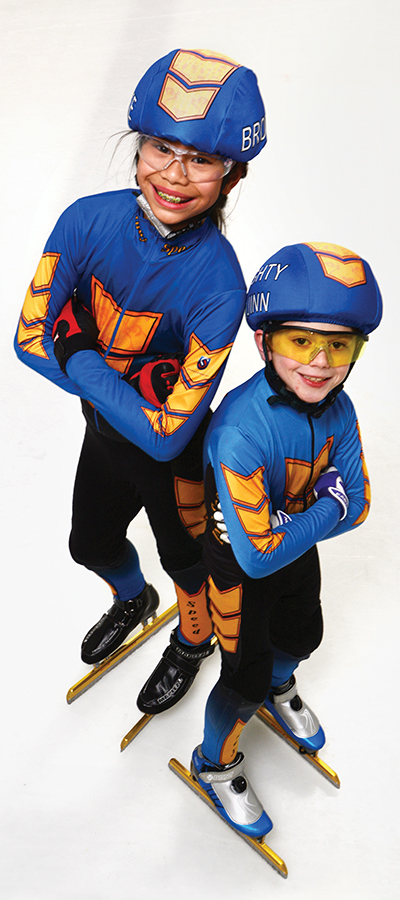
Brooke and Quinn Derheimer, speed-skating siblings from Indianapolis, are honing their skills today for a shot at the Winter Olympics sometime in the future.
Photos by Richard G. Biever (unless noted)
Athletes from around the world will compete for gold at the 2018 Winter Olympic Games in Pyeongchang, South Korea, this month. Two Indianapolis youngsters are also training for Olympic gold — even though their quest for their goal is not in the immediate future.
Brooke Derheimer, 10, recently qualified for the 2018 Short Track Age Group Nationals in March — the only kid from Indiana to do so. Her younger brother, Quinn, 9, hopes to qualify this month.
Cindi Hart, head coach of the IndySpeed Sports Club, is impressed with both skaters’ skills. “They’ve got the desire, talent and family backing. They have the potential to go as far as they want to go. My job is to keep them safe, focused and improving.”
Their speed skating journeys started when Brooke first put on a pair of figure skates at the age of 3. When her parents, Jon and Ann Derheimer, adopted her from Vietnam, she was underdeveloped. They put her in group figure skating lessons with hopes of strengthening her legs and improving her balance. It worked. They just didn’t realize she’d like it so much.
Ann could tell Brooke loved skating after she competed for the first time. “I was so worried because she was so little, and she was competing on the full ice. But she got off the ice, and she was beaming. It was then that I was like ‘oh my, she’s kind of hooked.’”
Quinn, who is also adopted, tagged along to Brooke’s practices and loved watching the older hockey players working out. He tried hockey, but his parents quickly realized it wasn’t for him. Though he enjoyed skating fast and doing drills, when he got off the ice, he complained about the other skaters bumping into him, Ann said.
“People act like (hockey) is a football game,” Quinn said. “For speed skating, you don’t have to worry about people getting in your way or people hurting you. You just get to do laps.”
Becoming ‘Mighty Quinn’

Even though he might be small in stature, Quinn quickly picked up the nickname “Mighty Quinn” (a reference to a 1960s Bob Dylan song) by the families of competitors who watched him dash around the ice.
Quinn’s transition into speed skating happened by chance during a public session at Perry Park Ice Rink on Indianapolis’ south side. While practicing in his hockey skates, Quinn followed a couple skating laps in speed skates and tried to mimic their moves. The couple — future coach Cindi Hart and her husband, Ken — quickly noticed him and brought him a pair of speed skates to try.
“The next thing we knew, he was keeping up with us,” Cindi said. “He’s this little phenom with all this potential and talent.”
Three months later, he competed in his first competition — the Land of Lincoln invitational — and won every heat in his meets. He was 5, competing against 6-, 7- and 8-year-olds. A competitor’s parent soon nicknamed him “Mighty Quinn,” a reference to a 1989 movie and song from the 1960s.
At later competitions, competitors’ families quickly began recognizing him. “I remember standing by the glass, and I could hear two or three different parents talk about ‘that little guy from Indiana.’ I was just beaming,” Ann said.
Like her brother, Brooke tried speed skating, too, and loved it right away. She continues to figure skate and switches back and forth between the two sports.
“When I first got on speed skates, it was a little hard,” Brooke said. “But now that I’ve gotten a little better and know how to center myself better, it gets a little easier each time we learn something new.”
Last fall, Brooke reached her age group national qualifying time in her favorite event — the 500 meters. While her current lap time is 13 seconds, she wants to cut it down to 11 seconds by March to place well at nationals, which will be held in Saratoga Springs, New York. “I’m going to keep doing off-ice: working on stairs, pushing harder on the ice and building my legs up so I can get a bigger push,” she said.
In speed skating, she specializes in quick starts, whereas Quinn prefers longer distances.
“I have a big gas tank,” Quinn said. “When people start to get tired in the last lap, I don’t. I can just get around them.”
“Quinn needs to work on starts, and I need to work on endurance,” Brooke added. “So, there’s something we can help each other with. …. You get a benefit out of that because he can do things I can’t, and I can do things he can’t.”

Quinn, left, and Brooke break away from a start line during timed repeat drills around the ice at a weekend practice in Fishers.
Competing against each other
For the siblings, competitions always require out-of-state travel. They load up on protein for breakfast at a hotel and eat snacks in between races. A competition often includes three events, but six races — a semi-final and final round for each event. The first and second place finishers in a semi-final and the third fastest skater overall qualify for the final round. To win overall, points are combined from each final event.
Because Quinn and Brooke are currently in the same age group, they sometimes race in the same heat in competition.
“When I practice with my brother, it’s all fun and games. But when it comes to competition, we both want to win,” Brooke said. “It pushes me harder because I know he could beat me, and I don’t want him to.”
While their family tries to do five or six invitationals per season, this March will be their first time competing in a national speed skating competition.
“I’m excited and nervous mostly,” Quinn said. “I’m excited to win, but I’m nervous that I’ll fall.”
But has he ever fallen in competition? Once, but he bounced up so quickly he stayed in first, his mom said.
Competition time is tough on the Derheimer parents. Jon said he’s a nervous wreck when his kids compete: “I can’t sit. I have to pace.”
“It’s really hard when they’re both on the ice and in the same heat,” Ann added. “We’re just yelling ‘Go Derheimers’ or ‘IndySpeed.’”
To prepare for competitions, the siblings practice 3.5 hours on ice and 6 hours off ice per week. They have even attended clinics with Olympians at the Pettit National Ice Center in Milwaukee, Wisconsin. The center, which features a 400-meter oval long track — one of only two in the country, hosted the 2018 Olympic Long Track Trials in early January. At this center’s clinics, speed skaters of all levels train on the ice for 4 hours and off the ice for 6 hours with a 30-minute lunch break each day.
“After that, your legs burn. You feel like you can’t walk,” Brooke said.
Worth the scheduling challenges
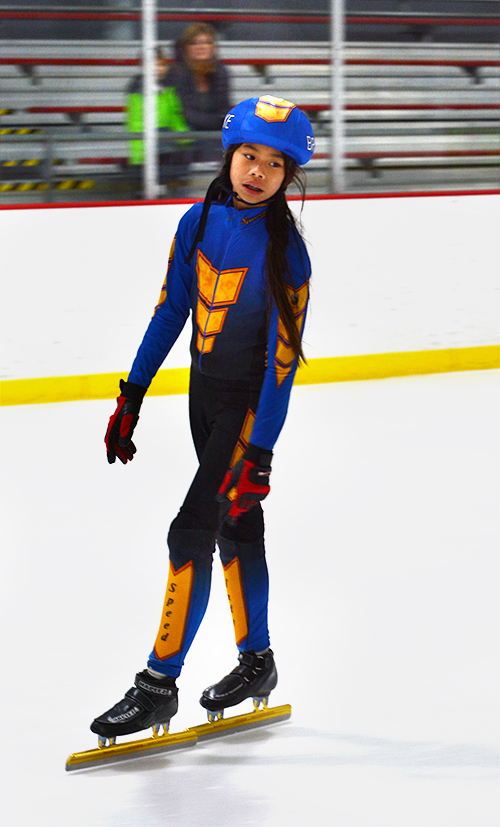
Brooke takes a breather after repeats, as she skates past her mom, Ann, in the bleachers with a little brother.
Managing schedules for work, school and their kids’ activities can be a challenge, but to Jon and Ann, it’s worth it.
“We do what we have to do, so they can get where they need to be,” Jon said. “I try to put them in a circumstance where they will succeed. If they do succeed, then that takes over. They’re self-motivated and will keep pushing themselves out there in practice so they can learn more and do well.”
Their coach, Cindi Hart, helps her skaters create short-term, achievable goals. For Quinn, that includes quicker, “twitchier” starts while Brooke plans to reduce her lap time and strengthen her legs to improve her endurance. Long-term, though, both siblings have Olympic dreams.
“I want to go to the Olympics and be the next Apolo Ohno,” Quinn said, referring to the eight-time Olympic medalist.
“Well, maybe not the next Apolo Ohno,” Quinn second-guessed himself. “I could be faster.”
“I want to be the first person to win the Olympics in both figure skating and speed skating,” Brooke added.
Hart said the siblings have the trifecta for success in speed skating — natural talent, focus and desire, and fantastic parents to support them no matter what.
“When Quinn’s not skating, he’s like the Tasmanian devil, whirling and twirling all over the place,” Hart said. “But he has this focus and commitment. When he’s on the ice, he’s so mature. It’s like laser focus.”
Hart said both Brooke and Quinn listen to instruction and apply it to their skating well, which is especially important for their age.
“A coach’s dream is to be able to tell someone what to do to get better and then actually see them do it,” she said. “That’s a great skill to have.
“It really is an honor for me to be able to help facilitate speed skating in Indianapolis and to facilitate Brooke and Quinn’s future potential,” Hart said. “It’s an honor just to get to watch them grow.”
Written by Electric Consumer staff
More photos of Brooke and Quinn

Before taking to the ice for practice, IndySpeed teammate Duree Brown shows Brooke a warm-up technique using a “turn belt.” Pulling against the belt simulates the g-forces of the tight turns at speed on the ice and works the muscles used.
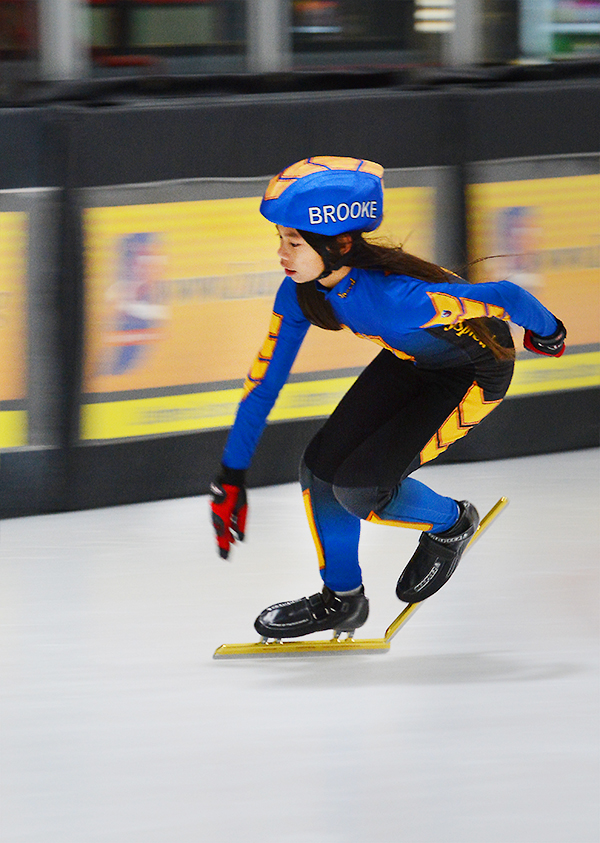


Quinn tunes out distractions as he prepares himself mentally for an upcoming race during the 2017 Park Ridge Open speed skating competition in Park Ridge, Illinois.
Photo by Marina Samovsky Photography

Quinn shows off a pin coach Ken Hart presented to all the IndySpeed skaters before a practice. The pin combines the logos of the U.S. Speedskating team and the 2018 Winter Olympics.
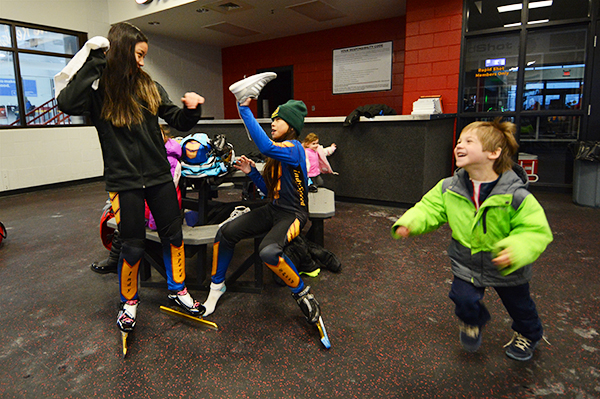
Brooke and a teammate horse around after a 7 am Sunday morning practice in the break area at the Fishers ice arena while her little brother and sister literally run rings around them.
Skating away in Indiana
Know someone with his or her own Olympic dreams? Here’s a list of skating clubs around the state offering lessons for figure skating, hockey and speed skating.
FIGURE SKATING:
• Ice Skating Club of Indianapolis
Carmel
www.skateisci.com
• Indiana/World Skating Academy Figure Skating Club
Carmel
www.facebook.com/IWSAFigureSkatingClub
• Lincoln Center Skate Club
Columbus
www.sites.google.com/lcsccolumbus.org/home/home
• Greater Evansville Figure Skating Club
Evansville
www.gefsc.com
• Fishers Figure Skating Club
Fishers
www.indyfueltank.com/figureskating
• Fort Wayne Ice Skating Club
Fort Wayne
www.fortwayneiceskatingclub.org
• Sycamore Ice Skating Club
Indianapolis
www.sycamoreisc.org
• Winter Club of Indianapolis
Indianapolis
www.winterclubindy.org
• Irish Figure Skating Club
South Bend
www.irishfsc.org
HOCKEY:
• Indianapolis Youth Hockey Association
Carmel
www.iyha.com
• Columbus Youth Hockey
Columbus
www.columbusyouthhockey.org
• Evansville Youth Hockey
Evansville
www.eyha.us
• Fort Wayne Amateur Hockey Association
Fort Wayne
www.fwaha.org/page/show/488000-fwaha-home-page
• Junior Fuel Hockey
Indianapolis and Fishers, Indiana
www.juniorfuelhockey.com
• South Stars High School Hockey Club
Indianapolis
www.southstarshockey.net
• Irish Youth Hockey League
South Bend
www.iyhl.club
SPEED SKATING:
• Crossroads Speedskating
Columbus
www.crossroadsspeedskating.org
• IndySpeed Sports Club
Fishers
www.indyspeed.org
Watching the Winter Games
2018 Winter Olympics
• Pyeongchang, South Korea
Feb. 9-25
pyeongchang2018.com
Fast facts:
• 102 gold medals
• 2,800 athletes
• 85+ national Olympic committees
Tuning in the games:
The Olympics will air on NBC networks. Viewers can stream events live and on-demand on NBCOlympics.com and the NBC Sports app.
Hoosier Goepper goes for gold:
When watching the Olympics, keep your eyes peeled for freestyle skier Nick Goepper. The 23-year-old native of Lawrenceburg, Indiana, won bronze in 2014 and will be going for gold this time.
Other Team USA athletes to watch:
• Mikaela Shiffrin, alpine skiing
• Elana Meyers Taylor, bobsled
• John Shuster, curling
• Nathan Chen, figure skating
• Gus Kenworthy, freestyle skiing
• Brianna Decker, hockey
• J.R. Celski, short track speed skating
• Sarah Hendrickson, ski jumping
• Chloe Kim, snowboarding
Sources: olympic.org, teamusa.org

